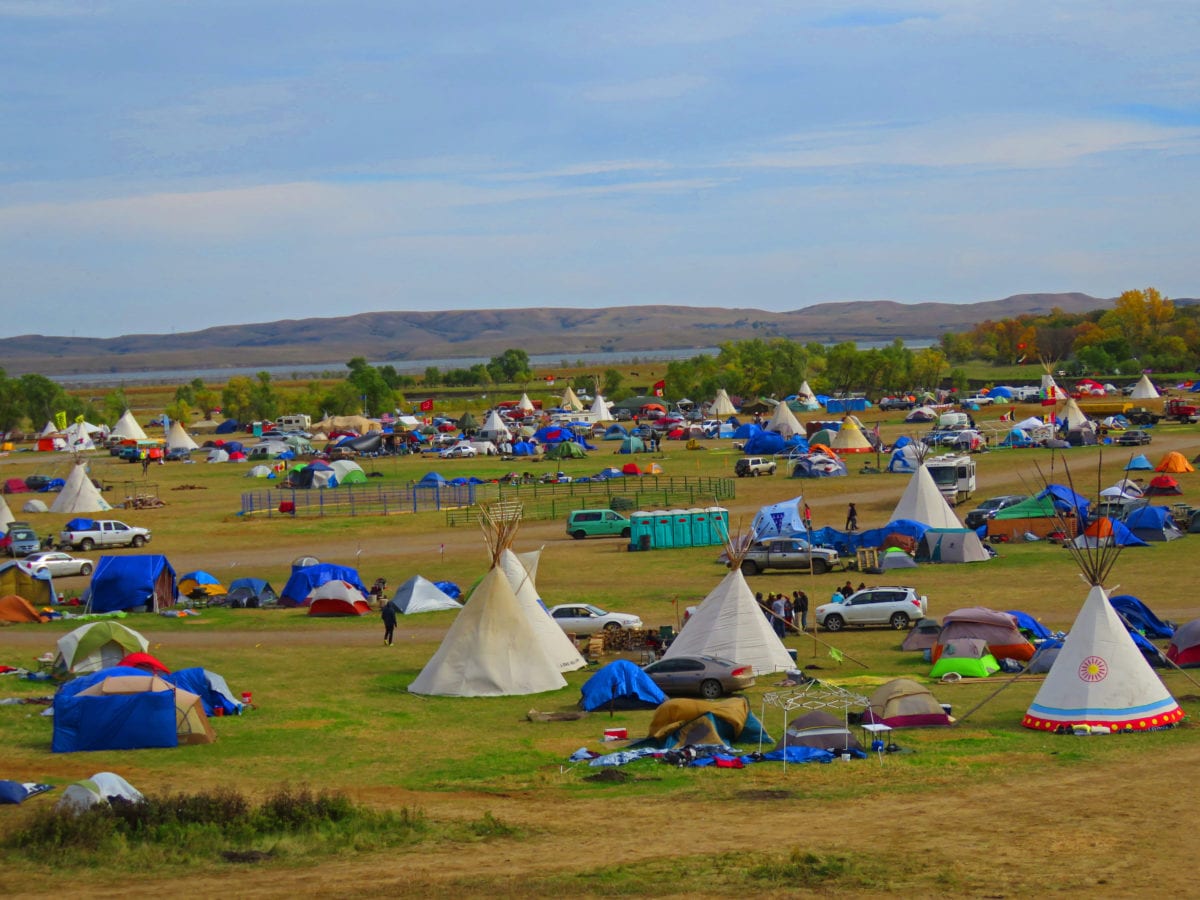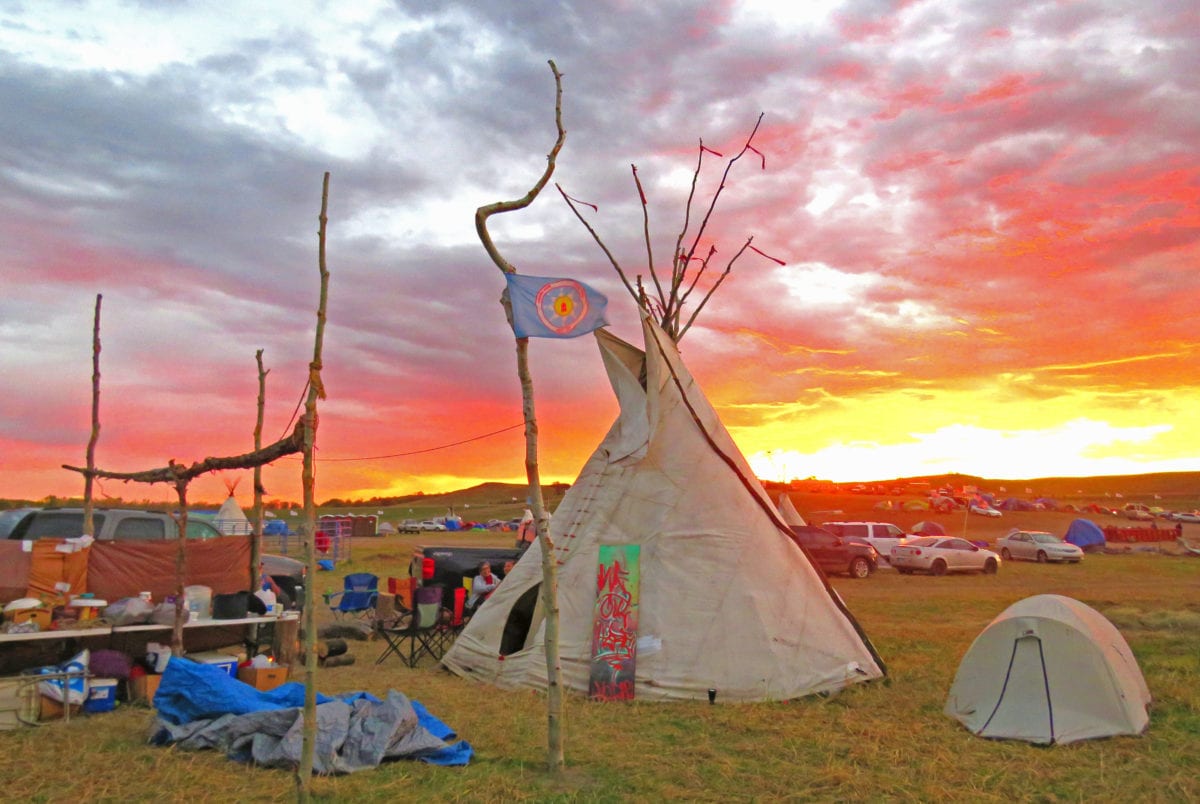
A wide angle view of the overlow Sacred Stone camp where the Cannon Ball and Missouri Rivers converge in Cannon Ball, N.D.: Glynn Wilson
By Glynn Wilson –
A coalition of 12 attorneys general around the country have filed friend of the court briefs in support of a federal lawsuit by environmental groups challenging the legality of the Trump administration’s permit for the Keystone XL pipeline transporting Canadian tar sands oil into the United States and across the American West.
The pipeline relies on Nationwide Permit 12, which broadly authorizes the construction of oil and gas pipelines across bodies of water. The Lakota Sioux in North Dakota and a number of non-profit groups have challenged the legality of the permit, and the attorneys general argue that the permit is invalid since the U.S. Army Corps of Engineers was required to engage in consultation with the U.S. Fish and Wildlife Service and/or the National Marine Fisheries Service under the Endangered Species Act before issuing the permit.
Maryland Attorney General Brian E. Frosh joined in that effort Tuesday with an amicus brief filed in the U.S. Court of Appeals for the Ninth Circuit.
“The Keystone XL Pipeline is an enormous construction project that would disrupt habitats and ecosystems from Canada to Nebraska,” Attorney General Frosh said in a statement announcing the filing. “This is a lose/lose project. It will pollute habitats and put endangered species at much greater risk, and it will be a significant contributor to climate change to boot.”
Environmental groups had expanded their federal lawsuit back in 2019 challenging the Trump administration’s apparent illegal approval of the tar sands pipeline, suing the Army Corps of Engineers over its streamlined approval of the project and challenging the Corps’ failure to ensure that endangered species would not be harmed by the construction as well as leaks and spills.
The U.S. District Court for the District of Montana has already ruled that the Trump administration violated bedrock environmental laws by issuing a permit for Keystone XL without adequately evaluating critical information on the project’s environmental impacts, including tar sands oil spills and climate change. Tar sands oil is thick, heavy crude extracted from Bakken shale formations in Canada’s outback and Montana, and is already being shipped by train aboard the Canadian National Railroad through small towns in the U.S. to the Port of Mobile in Alabama for transport to refineries on the Gulf Coast and export abroad.
Related: Mobile Alabama’s Historic Africatown At Risk From Tar Sands Oil Storage Tanks, Pipelines
Although President Donald J. Trump effectively circumvented the Montana court ruling by issuing a new permit in March, the fact remains that no federal agency has yet completed the analysis required by law, according to the Sierra Club and other groups.
President-Elect Joe Biden has already said they he would revisit Trump’s decision once he is sworn in come January and he has named many members of his cabinet who are expected to make the environment, global warming and climate change a priority again by the federal government.
President Barack Obama had killed the pipeline before the election of 2016.
The federal lawsuit was filed last July challenging the Army Corps’ approval of the pipeline to be constructed through hundreds of rivers, streams, and wetlands without evaluating the project’s impacts as required by the National Environmental Policy Act and the Clean Water Act.
“Though he seems to think otherwise, Donald Trump is not above the law, and we won’t allow him to endanger wildlife, clean water, and the climate to allow a Canadian company to move more tar sands through the United States,” said Sierra Club Senior Attorney Doug Hayes. “We’ve held off construction of Keystone XL for more than a decade, and we won’t stop until this dirty tar sands proposal is put to rest for good.”
The Keystone XL Pipeline is an expansion to an existing pipeline system that would transport up to 830,000 barrels per day of crude oil from Alberta, Canada, and the Bakken shale formation in Montana to existing pipeline facilities near Steele City, Nebraska. The crude oil would come from oil sands operations, the extraction of which is particularly energy intensive. The pipeline would also cross nearly one thousand bodies of water, causing significant impacts to water quality, habitat and endangered species.
“Regulators can’t ignore that Keystone XL will devastate waterways and protected species through oil spills and habitat destruction,” said Jared Margolis, a senior attorney with the Center for Biological Diversity. “We’re still fighting Trump’s attempt to ram through this dirty fossil fuel project. This destructive pipeline should never get the chance to ruin clean water that’s crucial to people and endangered species.”
While Trump has said over and over again the Keystone XL pipeline is already being built, people who live in the impacted states know the reality and risks, according to Jane Kleeb of the Bold Alliance Founder.
“Our scenic Niobrara River and the Platte River, where Sandhill and Whooping Cranes migrate, along with farmers’ water wells, are all at risk with this foreign, export pipeline,” Kleeb said at the time of the most recent lawsuit filing. “Trump may not believe in the rule of law, but we the people do, and we will take to the streets, courts and cornfields to ensure this pipeline is never built.”
The Trump permit expedites the approval of “the construction, maintenance, repair, and removal of utility lines [including oil and gas pipelines] and associated facilities” in waters of the United States, without requiring an applicant to seek an individual permit under the federal Clean Water Act. In most cases, according to Attorney General Frosh, projects utilizing the permit may be constructed without further action by, or notification to, the Corps.
“In other words, the permit all but assures that pipelines will be covered by the general permit despite extensive environmental impacts to listed species,” he said. “However, in reauthorizing Nationwide Permit 12, the Corps bypassed the Endangered Species Act’s formal consultation process — in violation of the law.”
“Trump’s continued attempt to rubber stamp the polluting Keystone XL pipeline without a full environmental review is outrageous,” said Marcie Keever, Legal Director at Friends of the Earth. “On such a major project, the communities who are on the frontlines deserve a comprehensive environmental review to protect themselves, our environment and endangered species. Construction of the Keystone XL pipeline would be devastating for the farmers, tribes and communities along its route. Blocking this pipeline will help stop Trump’s ongoing corruption.”
The Trump administration has put the cart before the horse by approving this dirty pipeline before following federal law and ensuring it will not harm endangered species along the proposed route, added Jackie Prange, senior attorney with the Natural Resources Defense Council.
“In fact, Keystone XL’s effects on species—just like its effects on water bodies, nearby communities, and the climate—would be devastating,” Prange said.
Enacted under the Nixon Administration in 1973, the Endangered Species Act is intended “to halt and reverse the trend toward species extinction, whatever the cost.” Section 7 of the Endangered Species Act requires a federal agency to engage in formal consultation with the U.S. Fish and Wildlife Service and/or the National Marine Fisheries Service when a proposed federal action “may affect a listed species or critical habitat.”
In the brief, the attorneys general argue that Nationwide Permit 12, on which the Keystone Pipeline relies, is invalid because the Corps failed to consult with federal wildlife agencies regarding the impacts that the permit might have on federally listed endangered and threatened species, as required by Section 7 of the law.
We were there in Cannonball, North Dakota to cover the international protests of the pipeline in the fall of 2016.
Related Coverage: Standing Rock Pipeline Protestors Vow to Defy Eviction Order and Remain Camped on Public Land
More Photos

















Time and time again this administration seems to follow the creedo that if something is racist and against peoples of color no matter the damage, disruption, or ill effect it may have on the land, water, air, or people; if it is financially profitable to special interests or vulture capitalist, they will undoubtedly pursue it.
Isn’t strange how the highly toxic tar sands crude Keystone XL pipeline across the U.S. needs to be built while the Nordsteam II pipeline carrying less toxic natural gas on another continent needs to be stopped.